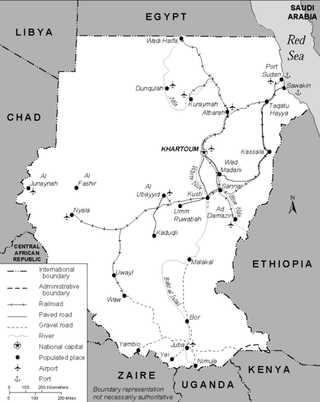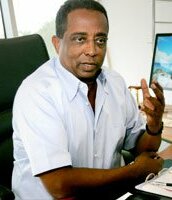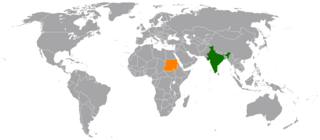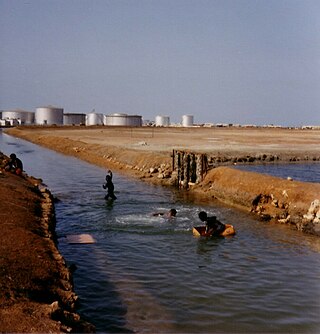
Khartoum or Khartum is the capital of Sudan. With a population of 6,344,348, Khartoum's metropolitan area is the largest in Sudan.

The economy of Sudan is largely based on agriculture and oil exports, with additional revenue coming from mining and manufacturing. GDP growth registered more than 10% per year in 2006 and 2007. Sudan had $30.873 billion by gross domestic product as of 2019, and has been working with the International Monetary Fund (IMF) to implement macroeconomic reforms, including a managed float of the exchange rate. Sudan began exporting crude oil in the last quarter of 1999.

Transport in Sudan during the early 1990s included an extensive railroad system that served the more important populated areas except in the far south, a meager road network, a natural inland waterway—the Nile River and its tributaries—and a national airline that provided both international and domestic service. Complementing this infrastructure was Port Sudan, a major deep-water port on the Red Sea, and a small but modern national merchant marine. Additionally, a pipeline transporting petroleum products extended from the port to Khartoum.

The University of Khartoum is a public university located in Khartoum, Sudan. It is the largest and oldest university in Sudan. UofK was founded as Gordon Memorial College in 1902 and established in 1956 when Sudan gained independence. Since that date, the University of Khartoum has been recognized as a top university and a high-ranked academic institution in Sudan and Africa.

Education in Sudan is free and/or compulsory for children aged 6 to 13 years. Primary education up to the 2019/2020 academic year consists of eight years, followed by three years of secondary education. The primary/secondary educational ladder of 6+3+3 years was switched in 1965 and during the Omar al-Bashir presidency to 8+3 and is scheduled, during the 2019 Sudanese transition to democracy, to return to 6+3+3 in the 2020/2021 academic year. The primary language at all levels is Arabic. Starting in the 2020/2021 academic year, English is to be taught starting at kindergarten. Schools are concentrated in urban areas; many in the South and West were damaged or destroyed by years of civil war. In 2001 the World Bank estimated that primary enrolment was 46 percent of eligible pupils and 21 percent of secondary students. Enrolment varies widely, falling below 20 percent in some provinces. Sudan has 36 government universities and 19 private universities, in which instruction is primarily in Arabic.

Osama Daoud Abdellatif is a tycoon Sudanese businessman and the chairman of DAL Group, a large number of companies based in Khartoum, Sudan.
The Al-Mogran Development Project is an over $4 billion development project undertaken by the Alsunut Development Company that seeks to develop several thousand acres in downtown Khartoum along the spot where the White Nile and Blue Nile merge to form the Nile. The discovery of oil in Sudan has provided the Sudanese government with a billion dollar surplus that allows the funding of this project.

Bank of Khartoum (BOK), is the largest bank in Sudan. With some 111 or more branches, it is also the commercial bank with the oldest continuous history in the country. The largest single shareholder is Dubai Islamic Bank. In 2011, the government of the United States of America lifted its sanctions on Bank of Khartoum. The US Treasury’s Office of Foreign Assets Control posted a notice on its website that it had removed Bank of Khartoum from the blacklist, meaning Bank of Khartoum could seek the return of blocked assets and resume limited dealings with U.S. financial institutions. However, in March 2014, several European and Saudi Arabian banks announced that they would cease transacting with Bank of Sudan.

China–Sudan relations are the bilateral relations between the People's Republic of China and the Republic of Sudan. China is currently one of Sudan's largest trade partners, importing oil and exporting low cost manufactured items as well as armaments into the country. Both states enjoy a very robust and productive relationship in the fields of diplomacy, economic trade, and political strategy. They formally established diplomatic relations on February 4, 1959, when Sudan formally recognized the sovereignty of the People's Republic of China and have since become close global allies, supporting each other in times of internal crises and international controversy such as during the Second Sudanese Civil War, the Darfur Crisis, and the Xinjiang Conflict. China continues to provide massive support to Sudan by developing its oil resources and supplying millions of dollars in loans, aid, foreign direct investments, and humanitarian assistance. In return, Sudan has become a reliable political and economic ally in the international arena, allowing China to maintain a significant stake in its oil sector.

India–Sudan relations, also called Indian-Sudanese relations or Indo-Sudanese relations, refers to the international relations that exists between India and Sudan.

South Sudan became the world's newest country and Africa's 55th nation on 9 July 2011. The South Sudanese Civil War, which started in December 2013, undermined economic development achieved since independence, making humanitarian work difficult to conduct within the country. As such, South Sudan is facing economic stagnation and instability in its first 10 years after independence. Moreover, poverty is widespread throughout the country as a result of inter-communal conflict, displacement, and the negative effects of the war in Sudan on the country's oil industry.

China–South Sudan relations refers to the bilateral relations between the People's Republic of China and the Republic of South Sudan. China recognized South Sudan's independence on July 9, 2011.

The mining industry of Sudan is mostly driven by extraction fuel minerals, including gold. Prior to becoming independent in 2011 as South Sudan, petroleum extraction in the autonomous region of Southern Sudan accounted for a substantial contribution to the country's economy. Following South Sudan's independence, growth in the gold mining industry saw substantial traction. By 2022, Sudan would emerge as the third-largest producer of gold in Africa.

Qatar–Sudan relations are the bilateral relations between the State of Qatar and the Republic of the Sudan. Relations were first established in 1972, when Qatar inaugurated its embassy in Sudan's capital city, Khartoum. Both countries are members of the Organisation of Islamic Cooperation and Non-Aligned Movement.

Photography in Sudan refers to both historical as well as to contemporary photographs taken in the cultural history of today's Republic of the Sudan. This includes the former territory of present-day South Sudan, as well as what was once Anglo-Egyptian Sudan, and some of the oldest photographs from the 1860s, taken during the Turkish-Egyptian rule (Turkiyya). As in other countries, the growing importance of photography for mass media like newspapers, as well as for amateur photographers has led to a wider photographic documentation and use of photographs in Sudan during the 20th century and beyond. In the 21st century, photography in Sudan has undergone important changes, mainly due to digital photography and distribution through social media and the Internet.
Geraldo João Martins is a Bissau-Guinean economist and politician who served as the prime minister of Guinea-Bissau from 8 August to 21 December 2023. He was minister of economy and finance in several cabinets from 2014 to 2015, from 2015 to 2016 and from 2019 to 2020.
Banking in Sudan covers the history, development and structure of banking in the Sudan. From the inheritance of the banking system from the Anglo-Egyptian Sudan to the establishment of the Sudan central bank in 1959 and development of Islamic banking in the mid 1970s.
Manufacturing in Sudan remains a relatively small sector of the economy, accounting for 11.75% of GDP as of 2019 according to the World Bank. Manufacturing in Sudan has a long history, with many forms of industry being attempted since World War II. Growth has been more consistent in the 21st century than previously.















